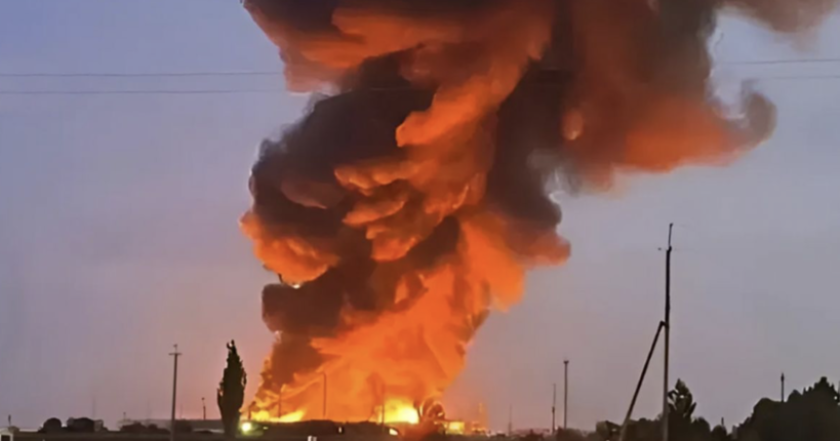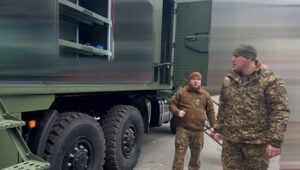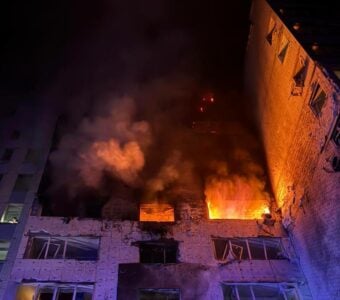Russian authorities aim to bolster air defense amid deteriorating economy and concerns for defense-industrial base – ISW

Photo: open sources
The Russian government is interested in strengthening air defense to protect the defense-industrial base, particularly because the Russian economy is deteriorating.
The Institute for the Study of War (ISW) reported that.
According to the analysts, the Kremlin is taking measures to protect industrial facilities in Russia's border regions from Ukrainian strikes.
On January 23, the Chairman of the Russian Security Council, Dmitry Medvedev, met with a group of representatives of the military-industrial commission of the Bryansk region and discussed increasing the production of Russian air defense systems and protecting industrial and state warehouses in the region.
Medvedev also visited the Bryansk Chemical Plant to "see what the situation is there," as the plant continues to fulfill a Russian state defense order after previous Ukrainian strikes.
Analysts add that Ukrainian strikes in the Russian rear were mainly aimed at the defense-industrial base and other facilities supporting the military efforts of the Russian Federation, including the Bryansk Chemical Plant.
"The Kremlin may be increasingly interested in strengthening air defense capabilities to protect the defense-industrial base facilities, in particular, as the state of the Russian domestic economy continues to deteriorate," ISW experts note in the report.
ISW Key Findings for January 23:
- Russia is reportedly planning to deploy additional North Korean forces, missiles, artillery systems, and multiple launch rocket systems (MLRS) to the Kursk region to support Russian long-range fire operations.
- The Kremlin appears to be growing increasingly concerned about perceptions of Russia's economic instability.
- Russian forces recently executed at least six unarmed Ukrainian prisoners of war (POWs) in the Donetsk region.
- Russian forces recently advanced in the Kursk region and near Toretsk and Pokrovsk.
- The Kremlin is reportedly taking measures to protect industrial facilities in Russian border regions from Ukrainian strikes.
For reference:
As reported, 121 drones attacked 11 regions of the Russian Federation, Moscow, and temporarily occupied Crimea on the night of January 24. Among the targets of the attack was an oil refinery in the Ryazan region.
On the night of January 21, the Ukrainian Defense Forces launched a drone strike on several vital facilities in Russia; in particular, they hit an oil depot in the Voronezh region and an aircraft factory near Smolensk.
It is worth mentioning that on the night of January 16, a series of explosions were heard in the Tambov region of Russia near Kotovsk and the village of Kuzmino-Gat, where a gunpowder plant is located. Air defense systems were operating in the area. Also, in the Voronezh region of the Russian Federation, local authorities reported an attack by drones on an oil depot.
In addition, on the night of January 14, the Ukrainian Defense Forces carried out the most massive strike on military facilities of the Russian army at a distance of 200 to 1,100 km deep into Russian territory. In particular, targets in the Bryansk, Saratov, Tula regions, and the Republic of Tatarstan were attacked.
The General Staff of Ukraine's armed forces reported a successful attack on the "Kristal Plant" oil storage facility in Engels, Saratov region. This comes shortly after a fire from a previous strike, which had been burning for five days, was finally extinguished.
The Bryansk Chemical Plant in Seltso was also hit. According to the General Staff, this is a strategic facility of the Russian military-industrial complex. It produces ammunition for artillery, multiple-launch rocket systems, aviation, engineering ammunition, and components for the Kh-59 cruise missiles.

Russian army lacks human resources for rapid offensive in Ukraine – General Cavoli

Ukraine firmly rejects compromise on recognizing occupied territories as part of Russia – Zelensky

Arming Ukraine with modern weapons could bring peace and Nobel Prize for Trump – Atlantic Council


















































